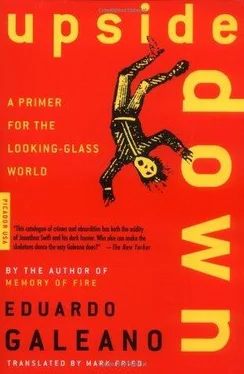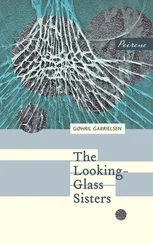There is no country in the world as unequal as Brazil. Some analysts even speak of the “Brazilianization” of the planet in sketching a portrait of the world to come. By “Brazilianization” they certainly don’t mean the spread of irrepressible soccer, spectacular carnivals, or music that awakens the dead, marvels that make Brazil shine brightest; rather they’re describing the imposition of a model of progress based on social injustice and racial discrimination, where economic growth only increases poverty and exclusion. “Belindia” is another name for Brazil, coined by economist Edmar Bacha: a country where a minority lives like the rich in Belgium while the majority lives like the poor of India.
In this era of privatization and free markets, money governs without intermediaries. A state that is judge and police and not much else keeps cheap labor in line and represses the dangerous legions of those without work. In many countries, social justice has been reduced to criminal justice. The state takes charge of public security; everything else is left to the market. And where the police can’t handle it, poverty — poor people, poor regions — is left to God. Even when government tries to dress up like some kindly mother, it has only the strength to exercise vigilance and mete out punishment. In these neoliberal times, public rights are reduced to public charity and handed out only on the eve of elections.
Every year poverty kills more people than the entire Second World War, which killed quite a few. But from the vantage point of the powerful, extermination is not a bad idea if it helps regulate a population that is growing too fast. Experts decry “surplus population” in the South, where ignorant masses violate the Sixth Commandment day and night: “surplus population” in Brazil, where there are seventeen inhabitants per square kilometer, or in Colombia, where there are twenty-nine. Holland has four hundred inhabitants per square kilometer and no Dutchman dies of hunger, but Brazil and Colombia belong to a handful of gluttons. Haiti and El Salvador are the most overpopulated countries in the Americas — just as overpopulated as Germany.
Points of View/1
From the point of view of the owl, the bat, the bohemian, and the thief, sunset is time for breakfast.
Rain is bad news for tourists and good news for farmers.
From the point of view of the natives, it’s the tourists who are picturesque.
From the point of view of the Indians of the Caribbean islands, Christopher Columbus, with his plumed cap and red velvet cape, was the biggest parrot they had ever seen.
Power, which practices and lives by injustice, sweats violence through every pore. The damned of dark skin, guilty of their poverty and their hereditary criminal traits, exist in shantytown hells. Advertising makes their mouths water and the police chase them from the table. The system denies what it offers: magic lamps that make dreams come true, neon lights announcing paradise in the city night, the splendors of virtual wealth. As the owners of real wealth know, there is no Valium to calm so much anxiety, no Prozac to snuff out so much torment. Jails and bullets are the proper therapy for the poor.
Twenty or thirty years ago, poverty was the fruit of injustice. The left decried it, the center admitted it, the right rarely denied it. How quickly times have changed: now poverty is fair reward for inefficiency. Poverty may arouse pity, but it no longer causes indignation. People are poor by the law of chance or the hand of fate. The dominant language — mass-produced images and words — nearly always serves a carrot-and-stick system that conceives of life as a pitiless race between a few winners and many losers, who were born to lose anyway. Violence is generally portrayed not as the child of injustice but as the fruit of bad behavior by poor sports, the numerous socially inept who fill poor neighborhoods and poor countries. Violence is their nature. It corresponds, like poverty, to the natural order of things, to the biological or perhaps zoological order. That’s how things are, that’s how they’ve been, and that’s how they will be.
The moral code of the end of the millennium condemns not injustice but failure. Robert McNamara, one of those responsible for the war in Vietnam, wrote a book in which he admitted it was a mistake. That war, which killed more than three million Vietnamese and fifty-eight thousand Americans, was a mistake not because it was unjust but because the United States carried on in full knowledge that it could not win. By 1965, according to McNamara, there was already overwhelming evidence that the invading force could not prevail; nonetheless, the U.S. government continued as if victory were possible. The fact that the United States spent fifteen years visiting international terrorism on Vietnam in order to impose a government the Vietnamese did not want does not even enter into the discussion. That the world’s premier military power dropped more bombs on a small country than all the bombs dropped during the Second World War is utterly irrelevant.
Points of View/2
From the point of view of the South, summer in the North is winter.
From the point of view of a worm, a plate of spaghetti is an orgy.
Where Hindus see a sacred cow, others see an enormous hamburger.
From the point of view of Hippocrates, Galen, Maimonides, and Paracelsus, there was a disease called indigestion but none called hunger.
From the point of view of his neighbors in the town of Cardona, Toto Zaugg, who wore the same clothes in summer and winter, was an admirable man. “Toto’s never cold,” they said.
He said nothing. He was cold, but he had no coat.
After all, during that long butchery the United States was exercising the right of big powers to invade whomever they wish and impose whatever they choose. Officers, businessmen, bankers, and makers of opinions and emotions in ruling countries have the right to create military dictatorships or docile governments. They can dictate economic or any other kind of policy, give the orders to accept ruinous trade deals and usurious loans, demand servitude to their lifestyles, and enforce consumer trends. This right is a “natural one,” consecrated by the impunity with which it is exercised and the rapidity with which its exercise is forgotten.
Power recalls the past not to remember but to sanctify, to justify the perpetuation of privilege by right of inheritance, absolving those who rule of their crimes and supplying their speeches with alibis. What schools and the media teach as the only possible way of remembering the past simply passes on the voices that repeat the boring litany of power’s self-sacralization. Exoneration requires unremembering. There are successful countries and people and there are failed countries and people because the efficient deserve rewards and the useless deserve punishment. To turn infamies into feats, the memory of the North is divorced from the memory of the South, accumulation is detached from despoliation, opulence has nothing to do with plunder. Broken memory leads us to believe that wealth is innocent of poverty. Wealth and poverty emerge from eternity and toward eternity they march, and that’s the way things are because God or custom prefers it that way.
Points of View/3
From the point of view of statistics, if a person earns a thousand dollars and another earns nothing, each of them appears to earn five hundred dollars when one calculates per capita income.
From the point of view of the struggle against inflation, adjustment policies are a good remedy. From the point of view of those who suffer such policies, they spread cholera, typhus, tuberculosis, and other damnations.
The Eighth Wonder of the World, Beethoven’s Tenth, the Eleventh Commandment of the Lord: on all sides one hears hymns of praise to the free market, source of prosperity and guarantor of democracy. Free trade is sold as something new, as if born from a cabbage or the ear of a goat, despite its long history reaching back to the origins of the unjust system that reigns today:
Читать дальше











